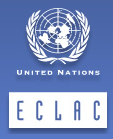Issue 35 of the UN Commission on Latin America and Caribbean's water resources management network circular looks at the role of water and sanitation services in a green economy, reflecting water's environmental service benefits in water tariffs, and research needs for adapting water and sanitation services to climate change.
 January 2012: Issue No. 35 of the “Circular of the Network for Cooperation in Integrated Water Resource Management for Sustainable Development in Latin America and the Caribbean” includes a discussion of Latin America’s input to the International Conference “Water in the Green Economy in Practice: Towards Rio+20,” which convened from 3-5 October 2011, in Zaragoza, Spain.
January 2012: Issue No. 35 of the “Circular of the Network for Cooperation in Integrated Water Resource Management for Sustainable Development in Latin America and the Caribbean” includes a discussion of Latin America’s input to the International Conference “Water in the Green Economy in Practice: Towards Rio+20,” which convened from 3-5 October 2011, in Zaragoza, Spain.
The UN Economic Commission for Latin America and the Caribbean (ECLAC), which produces the Circular, coordinated the LAC regional session at the Zaragoza conference. The conference sought to position the water agenda as a key element for advancing toward a green economy, one of the two themes of the upcoming UN Conference on Sustainable Development (UNCSD, or Rio+20), through discussion of practical implementation proposals and concrete proposals.
The conference looked at cases that illustrate how appropriate investments and financing models for managing water resources and providing drinking water and sanitation services can help reduce poverty and foster development. The Circular examines one of the LAC cases presented at the conference, namely Guatemala’s creation of a Specific Water Cabinet to coordinate water planning, management, policy and budget for water and sanitation and link it to strategic actions in social policy and rural development.
In addition, the Circular discusses lessons from LAC experience in drinking water and sanitation institutional frameworks and contracts, internalizing water’s environmental service benefits in water tariffs, the infrastructure gap in LAC, and the relationship between bilateral investment treaties and the right to water. It also includes an editorial on possible areas for further research regarding how to help region’s water institutions adapt to climate change. [Publication: Circular of the Network for Cooperation in Integrated Water Resource Management for Sustainable Development in Latin America and the Caribbean]